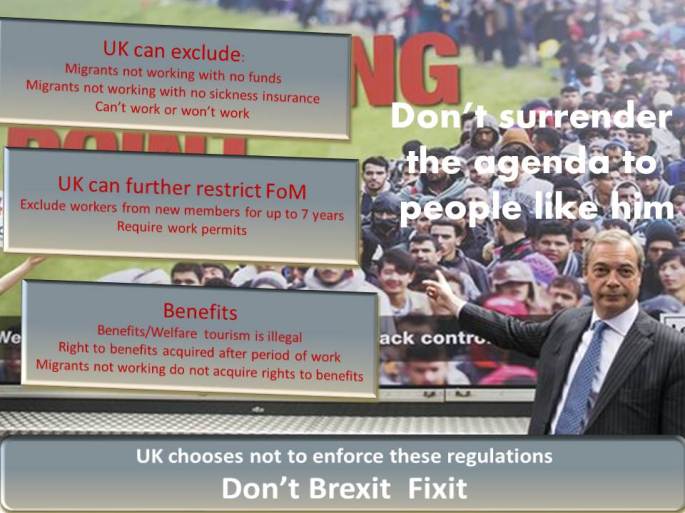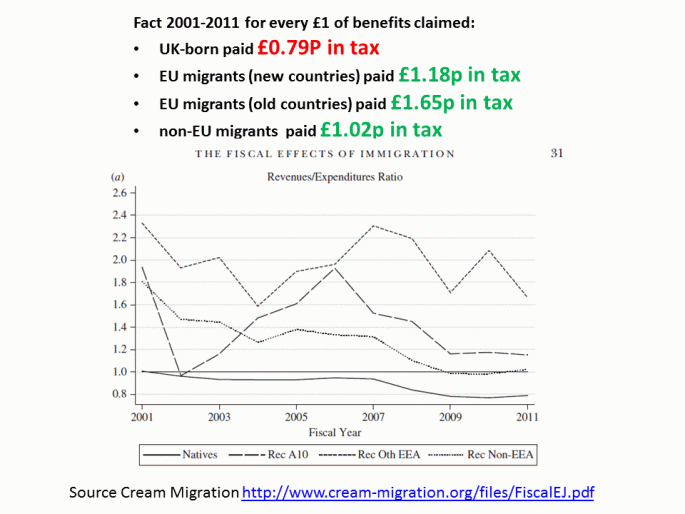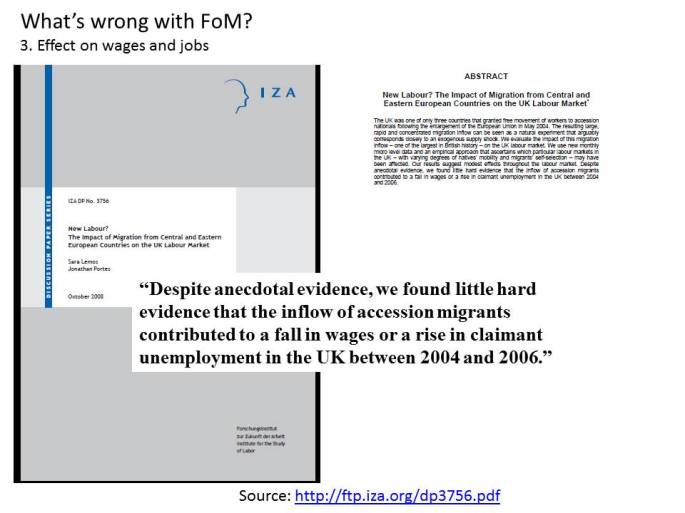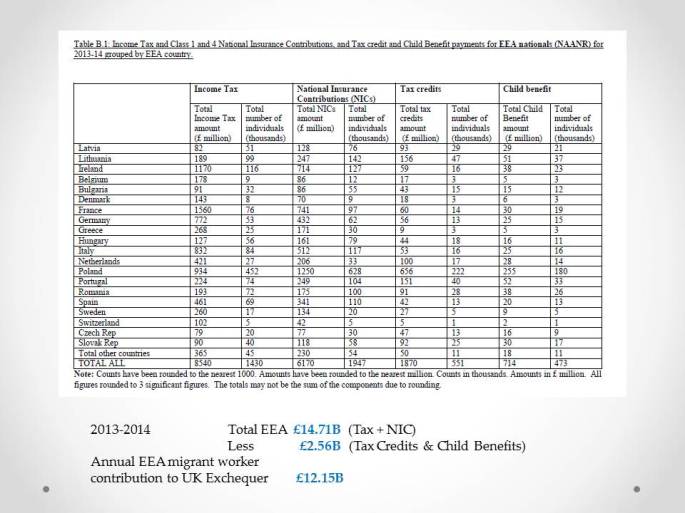Myth Buster – Debunking the horror stories surrounding the EU Freedom of Movement directive.
Currently Theresa May has made stopping FoM a red-line issue even at the expense of the UK’s membership of the Single Market.
Introduction
One of the four freedoms enjoyed by EU citizens is the free movement of workers. This includes the rights of movement and residence for workers, the rights of entry and residence for family members, and the right to work in another Member State and be treated on an equal footing with nationals of that Member State. Restrictions apply in some countries for citizens of Member States that have recently acceded to the EU.
There appears to be 4 major arguments in favour of stopping EU migrants exercising this freedom to come and work in the UK. It is my intention to debunk each of these arguments as plainly false.
Claim 1 – “Inability for the UK to control migration into the UK”
The rules and safeguards for the Freedom of Movement can be found here
A summary of these rules are:
Freedom for a citizen of another EU member state to move to the UK applies to
- Economically active EU-citizens (i.e. working)
- Plus their families if EU-citizens
- Non-economically active EU-citizens for up to 3-months
- Non-economically active (not working) EU-citizens longer than 3-months provided:
- They can show they have sufficient finance
- They take out a comprehensive sickness insurance policy
- FoM does not apply to
- Non-economically active EU-citizens without funds
- Non-economically active EU-citizens without sickness insurance
- EU-citizens who have no realistic chance of working
- Family members of an EU citizen who is not an EU Citizen may reside in the UK but does not have an automatic right to work
- Benefits
- EU-citizens working in the UK acquire rights to benefits after working for a period
- EU-citizens not working do not have rights to Benefits
- The UK has the right to restrict FoM through:
- Suspension of the FoM for up to 7 years from when a new member country joins by
- Preventing/prohibiting movement or
- UK can insist upon work permits for each migrant
- Benefit/Welfare “tourism” is illegal
- Suspension of the FoM for up to 7 years from when a new member country joins by
No-one prosecuted to-date as UK not tracking the issue
UK has chosen not to enforce these restrictions

There is a view that our politicians have either misunderstood these provisions or deliberately ignored them – read this blog from 2013 by Professor Brad Blitz for his view.
UK chose not to control the 2004 inflow of migrants
Certainly it is true that one of the sharpest rises in net migration came in 2004, when the Czech Republic, Estonia, Hungary, Latvia, Lithuania, Poland, Slovakia and Slovenia joined. However it is also fact that the UK was one of only 3 of the original EU members to choose not to apply transitional restrictions on these eight countries and as such the UK invited this surge. They could have avoided it if they wished. Restrictions can apply for up to 7 years after a new member joins the EU and there are provisions to restrict movement if there should be any localised “surges”.
UK does not know or track how many migrants are in the country
It is important to realise that the UK does not know how many EU migrants are in the country, as migrants are not checked or tracked. The numbers provided by Government are estimates only. The total migrant population is measured through the Labour Force Survey (LFS) and the Annual Population Survey (APS), which aggregates and supplements LFS data to improve statistical accuracy. The annual movement of migrants is measured primarily through the International Passenger Survey (IPS), which surveys passengers at UK ports, with additional data on migration to and from Northern Ireland and Home Office data on asylum seekers.
The UK could have managed the inflow of EU migrants and chose not to.
Claim 2 – “Need to restrict and /or eliminate so called “Benefit Fraud” and “Welfare Tourism””
An ongoing claim of the anti-EU lobby has been that EU migrants are coming to the UK merely to access public services and the host state’s benefits system. Indeed the UK Prime Minister Theresa May, when Home Secretary, claimed that these citizens are “benefit tourists.” However, whilst this has not stopped Ms May making this claim, the British government keeps no figures on how many European Union nationals claim welfare payments in the UK and so there is no evidence to back these claims.
Actually, when checked then rather than being a “unacceptable burden” our EU migrants are contributing significantly to the economy, far more than their UK-native counterparts.
A FactCheck study on these claims showed that EU migrants rather than being a drain on the UK bank balance actually contribute significantly, far more than their UK-native counterparts.
According to the European Commission, between 2004 and 2009 free movement from newer member countries increased the GDP of the old EU member countries by almost one percent.
A further study showed that where UK-natives (during 2001-2011) claimed more than they paid in Tax the reverse was the case for EU Migrants who contributed significantly.

So there is no Benefit Tourism that the UK can point to however, even if there were migrants abusing the system as claimed then the FoM directive is clear. The directive enables Member States to adopt the necessary measures to refuse, terminate or withdraw any right conferred in the event of abuse of rights or fraud, such as marriages of convenience. Article 35 of the directive expressly grants Member States the power, in the event of abuse or fraud, to withdraw any right conferred by the directive. The Migrant could be removed from the UK as well as prosecuted for Fraud.
The problem would seem to be more one of lack of control by the UK Government rather than “Benefit Tourism” by migrants.
Claim 3 – “Migrants reduce wages and take jobs of the UK-natives”
Another false claim I’m afraid.
This paper from the Centre for Research and Analysis of Migration (CReAM) at UCL found that immigration depressed wages slightly for the very low paid between 1997 and 2005. But the overall effect over the whole wage distribution was slightly positive.
Another report looked specifically at the period when the UK experienced a surge of EU migration 2004-2006 and found “Despite anecdotal evidence, we found little hard evidence that the inflow of accession migrants contributed to a fall in wages or a rise in claimant unemployment in the UK between 2004 and 2006.”

Research commissioned by the Migration Advisory Committee found that “inflows of working-age EU migrants did not have a statistically significant association with native employment” between 1995 and 2010.
Finally a study Brexit and the Impact of Immigration on the UK concluded:
- There is also little effect of EU immigration on inequality through reducing the pay and jobs of less skilled UK workers. Changes in wages and joblessness for less educated UKborn workers show little correlation with changes in EU immigration.
- EU immigrants pay more in taxes than they take out in welfare and the use of public services. They therefore help reduce the budget deficit. Immigrants do not have a negative effect on local services such as crime, education, health, or social housing
Claim 4 – “Unfair pressures on the NHS and public services caused by this uncontrolled mass migration”
This would, on the face of it, provide the most pressing argument in the case against FoM. Surely uncontrolled migration into an area could and has swamped local services and increased pressure on Public Services such as increased NHS waiting times.
Well, the first thing to consider is that the UK has singularly failed to apply the controls available to manage the movement of migrants, opting not to impose transitional restrictions in 2004 and failing to even track where EU migrants are. The truth is the Government do not know if this is an issue or not.
However, once again, facts disprove these allegations and a study of nationwide immigration data shows that immigration actually reduced waiting times for outpatient referrals. On average, a 10 percentage point increase in the share of migrants living in a local authority would reduce waiting times by 9 days.
A Channel4 FactCheck on the topic concludes:
“The Office for Budget Responsibility accepts the basic point that immigrants tend to improve the country’s finances. A major cut in immigration would mean tax hikes or more spending cuts, the watchdog has said.
This is because migrants tend to be younger and healthier, so they are more likely to be in work and paying taxes and less likely to be retired or to need healthcare.
HMRC recently said that recently arrived EEA nationals paid £3.1bn in income tax and national insurance in 2013/2014. They took out £0.56bn in HMRC benefits.

In 2014 all EU migrants paid £14.71B in taxes and claimed £2.56b in Tax Credits and Child Benefits meaning that they contributed a net £12.15B to the UK purse.
Of course, this kind of macroeconomic analysis cannot capture the experiences of people living in areas that have seen very high levels of EU immigration, so we can’t rule out incidents of pressure on local services.
Conclusion
I think it is pretty clear that there has been a concerted effort to show the FoM in a bad light and our current Conservative Government and Theresa May in particular must shoulder some of the blame for this.
The FoM has increased GDP (by an estimated 1%), has increased tax revenues (by a net £2b over benefits claimed), provided the largest source of labour for an otherwise impoverished NHS and also provided the freedom for 1.4m UK citizens to work or retire all over Europe.
The problems are in the main perceived rather than real and are exacerbated by the sheer incompetence of successive governments and the Home Office (again including the 6 years that Theresa May has been in charge). A failure to implement the available controls, manage or indeed even track the migration of labour into the UK. A shameful state of affairs that has contributed in no small part to the current Brexit debacle.

Would like to share this to my WordPress site.
LikeLike
please do – I want it shared – Peter
LikeLike
Done
LikeLike
will reads show up in my WordPress Stats?
LikeLike
No idea! Im new to this! But. They cannot read the whole article on my site. only a snippet. To read it all they have to come to you currently so you will get the reads that way I suspect.
LikeLike
I am confused. If the government already has rules which would allow it to restrict immigration and chooses not to use them, through incompetence or lack of will, how then will leaving the EU allow the government to restrict immigration? If the EU are to subte for our Home Office to administer, perhaps it prefers the broad-brush approach of “everybody out”? Surely the immigration fiasco has not been the driver for the Brexit fiasco? As you see, I am confused.
LikeLike
You are not alone, it seems to be a mix of incompetence, arrogance and a small number of very loud and seriously nasty people stirring the pot.
LikeLike
Lol 17 million is a small number. Thanks, mate. Your condescending arrogance is the reason you lost.
LikeLike
Latest HMRC numbers show EEA contributed £12B in 20013/2014 (Tax-(Tax credit and Child Benefit)) https://www.gov.uk/government/uploads/system/uploads/attachment_data/file/548156/HMRC_-_Ad_Hoc_Stats_Release_-further_TC_statistics_on_EEA_Nationals_JULY_-_FINAL_23rd_August_2016.pdf
£12b net contribution in 1 Year
LikeLike
Excellent stuff. So, because the means to control UK immigration has been available to us for many years, the 2010 Conservative manifesto set out plans to significantly reduce inflows. But it didn’t implement them, leaving the door open for Brexiteers to make control a red line issue – needlessly – when the key is to implement a progressive policy on integration. Would be very interested in an analysis of post Brexit immigration levels – given how many are so necessary for our economy, it must be unlikely that total immigration (EU and non EU) could fall below, say 250000.
LikeLike
also tories focus on net migration. Immigration has been steady for the last few years but emigration has fallen thus the UK Gov measure of net migration has hit “an all time high” dumb targets, http://blogs.channel4.com/factcheck/factcheck-eu-immigration/23016
LikeLike
Also produced an extract/reworked version focusing on powers the UK has not used http://wp.me/p7LzAR-4t
LikeLike
Hi Peter. I asked for a comment on this from a very respected UK academic figure who commented that the analysis broadly tallies with what many EU legal specialists have been saying for quite a considerable period of time already. I am doing my small best to highlight this via some forums and groups, some FB posts and a short online paper here: https://www.academia.edu/28764210/Labour_and_Brexit_three_reasons_not_to_despair
It seems to be of the utmost importance to disseminate this analysis especially among Labour MPs who don’t buy Brexit or Lexit but are scared of public opinion on immigration control. Thanks and well done. Colin
https://www.facebook.com/colin.gordon.714
LikeLike
Colin, My other bug bear/nightmare is that someone will trigger A50 without first arranging a way to stop the process. There is a body of opinion (Richard Corbett, Jean-Claude Piris) suggesting that the wording is loose enough for the UK to be able to change our mind and withdraw from the process after having declared our intention to leave. My view is that we should address the issue and get a withdrawal mechanism built in before someone the process is started. obviously I don’t want anyone to trigger A50 but they might and I want the UK to be able to stop once we realise what an awful deal it is. This mirrors some of your views and the composite motion from the labour conference and hopefully increases the chances of being able to stop. Here are my thoughts “UK don’t trigger Article 50 without ability to stop the process” https://medium.com/@peterc0206/uk-dont-trigger-article-50-without-ability-to-stop-the-process-b22e884b253d#.7g66pudh8
LikeLike
Peter, thanks for this, I had also seen the A50 piece, didn’t know it was your too but am not surprised to learn it was. Both of them came to my knowledge, by the way, thanks to fb posts by Prof Charles Turner at Warwick. My reading of A50 is that we can withdraw; I have seen the Lords’ report saying maybe we can but that it is too dangerous to take a chance. Of course a serious danger is that our Brexit ministers may positively desire A50 to be irrevocable. I need to read your A50 paper more closely. I would have thought that the EU would view a UK withdrawal of its A50 notification as a historic triumph, much better than a punitive hard exit, and would have no interest in closing of that option from its side. BTW I wrote an initial comment about the implications of your FOM piece here: https://www.facebook.com/colin.gordon.714/posts/1118715654885521 . (“**IF** this interesting analysis is correct, then it offers the perfect recipe for a 2017 UK U-turn. It will be discovered that previous Labour and Cameron governments had either overlooked, obstructed or negligently failed to deploy opportunities to control migration already available via the Four Freedoms regime of the Single Market. At the same time a commission of inquiry would determine that Leave zealots had misled both the nation and the government about existing EU arrangements. The PM could then sack the incompetent and culpable Brexit ministers, obtain a few symbolic reforms to freedom of movement which the 27 nations might be happy to endorse, and with overwhelming cross-party backing tell a grateful nation she had saved our economy from the imminent risk of collapse while honouring the ‘take back control’ wishes of the former 52%”).
I think it is important that both your analyses get wide attention. Bon courage, Colin
LikeLike
I am heartened to read the comments above and cannot understand how successive UK governments have been allowed to behave as they have over immigration controls. However, whereas Brexit would be a financial/economic disaster for the UK, no-one is addressing the broader geo-political consequences of the UK no longer participating in future EU decisions on issues inevitably affecting the UK, starting with the evolution of the EU itself and its functioning , international relations, trade, security, defence etc. The 27 member states will decide on their position on these issues, many of which will lead to talks/negotiations with the other global world players. What situation will the UK be in in these circumstances?
LikeLike
One key reason why the UK struggles to monitor/govern migration is that unlike many other European countries it lacks a single population register – in many countries it’s often combined with an ID card system.
Instead there are separate registers for elections, national insurance, NHS, plus the local registers for council tax etc. and in addition lots of private registers like Experian. Hence for many people moving to the UK, including me, it is surprising how difficult it is to prove where you live. The only modest change implemented for those from outside the EEA is a UK residency card scheme.
New Labour tried introducing an ID card scheme, but some conservatives including chief Brexiteer David Davis were vehemently opposed to the scheme.
LikeLike
Reblogged this on oddrops and commented:
⭐️
LikeLike
It is a fact that until recently there was no control of persons leaving the UK via the Eurostar service at St Pancras by the UK Border Agency.
LikeLike
Great News want to Reblog it
LikeLike
Reblogged this on Site Title and commented:
Great Post
LikeLike
yes please – spread as much as you can
LikeLike
Excellent piece of analysis that sheds light on a very dark corner. Would like to spread this about if you don’t mind.
LikeLike
Henry – yes please spread the word, that’s what it is there for – Peter
LikeLike
The right wing of the Tory party has been using the EU as a convenient scapegoat to hide behind. Austerity, the running down of factories/industrial production in the north of England, underinvestment in the NHS have all been laid at the door of the EU. Lies, all of it. But convenient lies. A small story: I am currently supporting a Hungarian family in their efforts to obtain UK citizenship. Since Brexit, they have had to be moved twice, as they/their kids have had harassment & verbal abuse from neighbours. In BOTH moves, they have been the ONLY people in their block to be working and NOT claiming benefits. The lazy Brits who shout abuse, stuff poo through their letterbox and killed their family pets would rather sit on their lardy arses.One thing that I hope, if Brexit happens, is that those who voted Leave are made to take up the menial low paid jobs they’d rather see done by Eastern Europeans. End of rant!
LikeLike